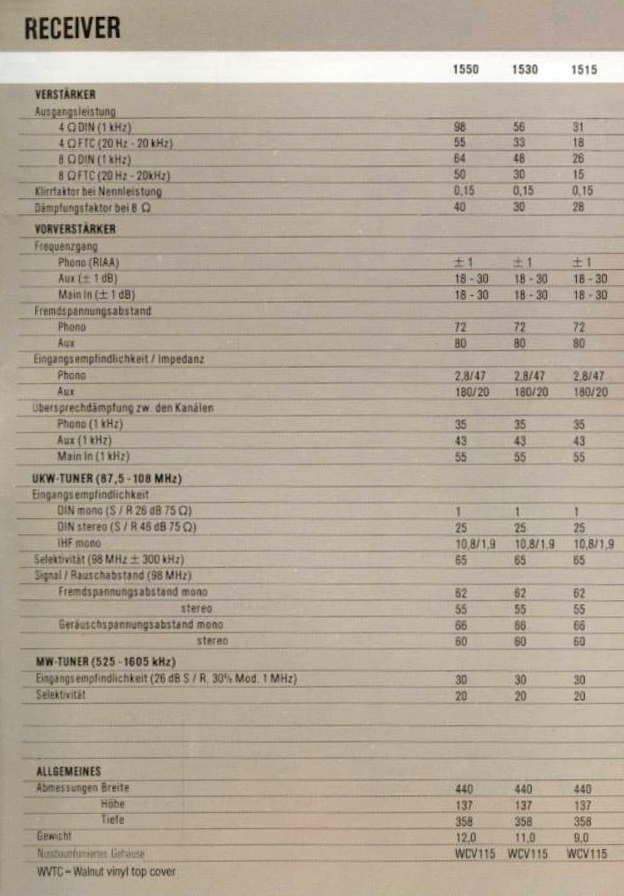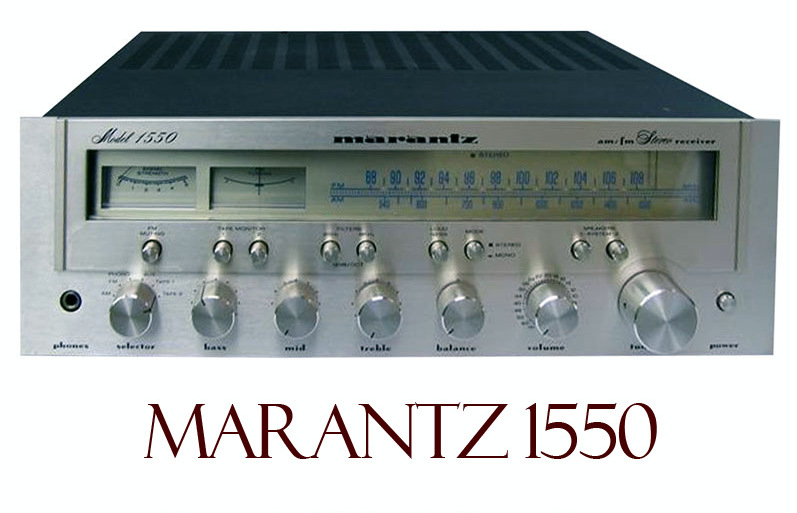Difference between revisions of "Marantz 1550"
| (2 intermediate revisions by one other user not shown) | |||
| Line 1: | Line 1: | ||
__NOTOC__ | __NOTOC__ | ||
| − | == | + | == Data == |
| − | {{ | + | {{navigation}} |
| − | ''' | + | '''General''' |
| − | * | + | * Manufacturer: [[Marantz]] |
| − | * | + | * Model: 1550 (Version L with long wave) |
| − | * | + | * Type: Receiver |
| − | * | + | * Years of manufacture: 1978 - 1980 |
| − | * | + | * Made in: Taiwan |
| − | * | + | * Color: Silver |
| − | * | + | * Remote control: no |
| − | * | + | * Original price approx.: 1'598 DM |
| − | ''' | + | '''Technical data''' |
| − | [[ | + | [[File:Marantz 1515-1530-1550-Daten-1980 bearbeitet-1.jpg]] |
| − | == | + | == Remarks == |
| − | * | + | * Other models in the same series: |
* [[Marantz 1515]] | * [[Marantz 1515]] | ||
* [[Marantz 1520]] | * [[Marantz 1520]] | ||
| Line 27: | Line 27: | ||
| − | == | + | == Pictures == |
| − | * | + | * Image: Marantz 1550 |
| − | [[ | + | [[File:Marantz 1550-1978.jpg]] |
| − | == | + | == Reviews == |
| + | * This series actually includes a total of six different models. Model 1515, 1530 and 1550, as well as the Models 1515L, 1530L and 1550L, which are largely the same as the aforementioned receivers, except for the addition of the longwave tuner. The series was manufactured in Taiwan from 1978 to 1980 and differs fundamentally from the receivers of the 22XX series, which are very popular among collectors nowadays. | ||
| + | * Not only the missing "Gyro-Touch" transmitter search wheel is missing here, but also the remaining quality of workmanship reveals that this series is aimed at the end user with a smaller budget. | ||
| + | |||
| + | A look under the hood as well as in the data sheet reveals that the same technology is in all six devices, which differ only in the amplifier part. Also from the outside you can see the red pencil, which had the say in their development. This can be seen most clearly on the bottom of the unit, which is made of cheap hardboard. Only the MR215/215L, 230/230L and 250/250L receivers, which are technically identical, were produced even cheaper, with parts of the front panel made of coloured acrylic, which at the time was a blatant break with the brand's long-standing philosophy of high-quality design. | ||
| + | |||
| + | * Cheap Taiwanese manufacturing, with which Marantz desperately tried to generate customers among the less solvent hi-fi enthusiasts at the end of the 1970s, could not stop the decline of the US cult brand. In 1980 Marantz was finally taken over by Philips. | ||
| + | |||
| + | * On the Internet you can find more pictures of this receiver, including views of the technical inner workings under Vintage Marantz. | ||
== Links == | == Links == | ||
| + | * www.vintage-marantz.com | ||
| − | [[ | + | [[Category:Receiver]] |
Latest revision as of 01:09, 25 March 2021
Data
General
- Manufacturer: Marantz
- Model: 1550 (Version L with long wave)
- Type: Receiver
- Years of manufacture: 1978 - 1980
- Made in: Taiwan
- Color: Silver
- Remote control: no
- Original price approx.: 1'598 DM
Technical data
Remarks
- Other models in the same series:
- Marantz 1515
- Marantz 1520
- Marantz 1530
- Marantz 1535
- Marantz 1550
Pictures
- Image: Marantz 1550
Reviews
- This series actually includes a total of six different models. Model 1515, 1530 and 1550, as well as the Models 1515L, 1530L and 1550L, which are largely the same as the aforementioned receivers, except for the addition of the longwave tuner. The series was manufactured in Taiwan from 1978 to 1980 and differs fundamentally from the receivers of the 22XX series, which are very popular among collectors nowadays.
- Not only the missing "Gyro-Touch" transmitter search wheel is missing here, but also the remaining quality of workmanship reveals that this series is aimed at the end user with a smaller budget.
A look under the hood as well as in the data sheet reveals that the same technology is in all six devices, which differ only in the amplifier part. Also from the outside you can see the red pencil, which had the say in their development. This can be seen most clearly on the bottom of the unit, which is made of cheap hardboard. Only the MR215/215L, 230/230L and 250/250L receivers, which are technically identical, were produced even cheaper, with parts of the front panel made of coloured acrylic, which at the time was a blatant break with the brand's long-standing philosophy of high-quality design.
- Cheap Taiwanese manufacturing, with which Marantz desperately tried to generate customers among the less solvent hi-fi enthusiasts at the end of the 1970s, could not stop the decline of the US cult brand. In 1980 Marantz was finally taken over by Philips.
- On the Internet you can find more pictures of this receiver, including views of the technical inner workings under Vintage Marantz.
Links
- www.vintage-marantz.com

